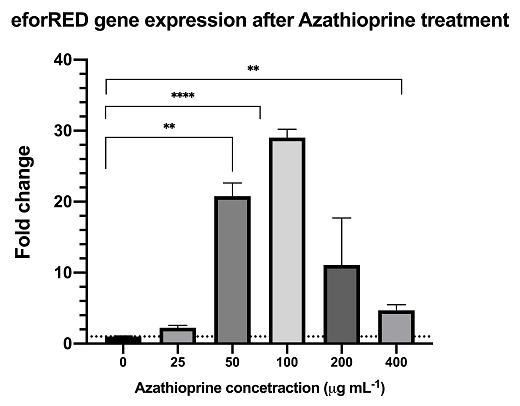Part:BBa_K3071023
Co-activator construct for activating synthetic clp-regulated pspA promoter with sequencing part
Description
This composite part contains the two translational units that encode the two proteins that encode the components for activating the pspA promoter include the sigma-54 RNA polymerase cofactor ((BBa_K3071021) and Clp-pspF fusion transcriptional activator (BBa_K3071020). The information encoding for the two related protein is transcribed as one mRNA strand in this design. This part is one of the three parts used to construct our detection system in our part collection, the other two parts include (BBa_K3071022) and (BBa_K3071024).
Biology

PspF (BBa_K3071006)has a hexameric structure, with α/β and α domains in each monomer (figure 1). It has ATPase activity in E. Coli to promote DNA strand separation, forming the open complex. Loop 1 (L1) and loop 2 (L2) are two loops locate in the α/β domains and α domains respectively. They are responsible for the interaction between PspF and the sigma 54. The 8 to 238 amino acids are the Sigma 54 interactive domain while the DNA strand binding motif is at the amino acid position 302 to 321.
C reactive protein-like protein (Clp) (BBa_K3071004) is a global transcriptional regulator that regulates virulence factors production by activating or repressing the expression of a large set of genes in the diffusible signal factor DSF pathway. It also regulates the genes that involve in extracellular polysaccharide (EPS) synthesis, flagellum synthesis, protein, and fatty acid metabolism, multidrug resistance, iron uptake. They also regulate genes that encoding extracellular enzymes, membrane components, and a few transcription factors.
RNA polymerase Sigma-54 factor is the initiation factor that promotes the attachment of RNA polymerase to the specific initiation site and its release. Naturally, this sigma factor is responsible for the expression of enzymes involved in arginine catabolism.
Usage

The responsible sensor kinase system detecting DSF in the environment compose of RpfC-RpfG phosphorylation relay. After a series of auto-phosphorylation in RpfC, phosphotransfer from RpfC to RpfG occurs. This leads to the activation of the phosphodiesterase domain in RpfG, which will degrade the second messenger cyclic-di-GMP. As one of the downstream results, Clp binds to its target CBS I and CBS II. Without the DSF induction, cyclic di-GMP will not be degraded but bind to the Clp. The binding between Clp and c-di-GMP prevents Clp from binding CBS.
Using the RpfC-RpfG system as a foundation, we fused the PspF protein with Clp to enhance binding specificity and prevent expression leakage. The DNA binding domain in the C-terminus of pspF (BBa_K3071006) is replaced by Clp to construct a fusion transcription activator for our reporter construct (BBa_K3071024) This transcription activator can activate the CBSI & II-regulated pspA promoter (BBa_K3071014) upon diffusable signal factor (DSF) appearance.
pspA promoter is a sigma-54 (σ-54) regulated activator depending on promoter. sigm54-RNA holoenzyme (σ-54 RNAP) forms an inactive transcriptional initiation complex on this promoter, which can be activated in E. coli by the bacterial enhancer-binding protein PspF (BBa_K3071006). PspF transcription activation domain (pspF TAD) functions by binding to upstream activation sequences (UAS) near the promoter and contacting the promoter-bound σ-54 RNAP via DNA looping stabilized by integration host factor (IHF). Previous research has demonstrated the property of pspF-dependent and enhancer-specific transcription activation of pspA promoter.
Activation of PspA promoter leads to mRNA expression of the reporter eforRed chromoprotein as an output signal after detecting the existence of DSF.
Characterization

Western Blot data shows that this construct is appliable to correctly express our candidate proteins under IPTG-induced T7 promoter activity. Clone was induced by 1mM IPTG at 32℃ and collected at different time points, which are 12hr, 16hr, 20hr, 24hr, and 28hr. After blotting with corresponding antibodies, pspF TAD-Clp was confirmed with successful expression at all time points. Results of blots probing Clp-pspF showed that clones collected at 12hr contained the highest amount of target proteins and the protein quantity decreased from 16hr to 28hr. This may due to degradation inside the cells.

Azathioprine is an indirect supressor to cyclic-di-GMP, treatment of azathioprine to bacteria culture can reduce the cyclic-di-GMP level and lead to activation of the pspF-Clp and by-pass the RpfC/RpfG two-component system.The result from rt-qPCR data shows that the above sysntehtic biological system is functional with significant up-regulation of reporter mRNA.

The result from rt-qPCR data shows that the above sysntehtic biological system is functional with significant up-regulation of reporter mRNA upon DSF activation.
Sequence and Features
- 10INCOMPATIBLE WITH RFC[10]Illegal XbaI site found at 953
- 12COMPATIBLE WITH RFC[12]
- 21INCOMPATIBLE WITH RFC[21]Illegal BglII site found at 956
- 23INCOMPATIBLE WITH RFC[23]Illegal XbaI site found at 953
- 25INCOMPATIBLE WITH RFC[25]Illegal XbaI site found at 953
Illegal NgoMIV site found at 1031
Illegal AgeI site found at 136
Illegal AgeI site found at 164
Illegal AgeI site found at 302
Illegal AgeI site found at 2509 - 1000COMPATIBLE WITH RFC[1000]
| None |
